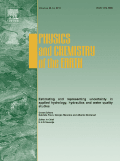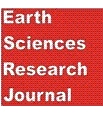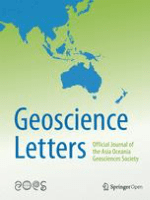
PHYSICS AND CHEMISTRY OF THE EARTH
Scope & Guideline
Illuminating Earth's Processes through Collaborative Science
Introduction
Aims and Scopes
- Geochemical Analysis and Environmental Assessment:
Research exploring the chemical composition and processes of geological materials, including studies of groundwater quality, pollutant dynamics, and the impact of anthropogenic activities on natural water bodies. - Remote Sensing and Geospatial Analysis:
Utilization of satellite and aerial imagery for monitoring land use changes, environmental degradation, and resource management, employing advanced techniques such as GIS and machine learning. - Hydrological and Climate Studies:
Investigations into the water cycle, including streamflow modeling, drought assessment, and the impacts of climate change on hydrological patterns, emphasizing the interplay between climate variables and water resources. - Geotechnical and Geological Investigations:
Research focusing on the mechanical properties of soils and rocks, landslide susceptibility, and the stability of geological formations, contributing to infrastructure development and natural hazard mitigation. - Sustainable Resource Management:
Studies addressing sustainable practices in agriculture, water resource management, and waste treatment, aiming to enhance ecological balance and promote environmental resilience.
Trending and Emerging
- Machine Learning and Artificial Intelligence Applications:
There is a rising trend in the application of machine learning techniques for predicting environmental phenomena, optimizing resource management, and analyzing complex datasets in earth sciences. - Climate Change Impact Studies:
Research addressing the effects of climate change on various ecosystems, hydrology, and agriculture is gaining momentum, reflecting global concerns over climate resilience. - Microplastic Pollution Research:
Emerging studies focusing on the sources, impacts, and remediation of microplastics in aquatic systems indicate a growing awareness of this critical environmental issue. - Integrated Water Resource Management:
Research exploring holistic approaches to water management, considering socio-economic factors alongside hydrological data, is becoming increasingly prominent. - Sustainable Development Goals (SDGs) Integration:
Studies that align research with the United Nations SDGs, addressing sustainability challenges and promoting ecological balance, are trending as researchers seek to contribute to global initiatives.
Declining or Waning
- Traditional Geological Surveys:
Research centered on basic geological mapping and mineral exploration has decreased as more emphasis is placed on integrated approaches that combine geochemistry, remote sensing, and environmental impacts. - Static Environmental Monitoring:
Studies that solely focus on static measurements without integrating dynamic modeling or predictive analytics are becoming less common, as there is a shift towards more comprehensive, data-driven approaches. - Conventional Agricultural Practices:
Research on traditional agricultural techniques is waning in favor of studies that explore innovative, sustainable farming practices that utilize technology and address climate variability. - Single-Factor Studies:
Research that examines isolated factors without considering the complex interactions within earth systems is declining, as interdisciplinary approaches gain prominence.
Similar Journals

Earth Sciences Research Journal
Unveiling Insights into Earth’s MysteriesThe Earth Sciences Research Journal, published by the UNIV NACIONAL DE COLOMBIA, serves as a pivotal platform for the dissemination of knowledge in the diverse field of Earth and Planetary Sciences since its inception. With an ISSN of 1794-6190 and an E-ISSN of 2339-3459, this Open Access journal has been committed to providing unrestricted access to high-quality research since 2004. Located in Bogotá, Colombia, it has gained recognition within the academic community, achieving a Q3 quartile ranking in Earth and Planetary Sciences and notable Scopus rankings, which further underscores its relevance and reach. Its scope encompasses varied research topics, making it an essential resource for researchers, professionals, and students alike, seeking to contribute to or stay informed on the latest developments in the Earth sciences up to the year 2024. The journal not only anticipates cutting-edge research but also emphasizes collaborative dialogues among global experts, driving forward the conversation on critical issues facing our planet.

Earth Science Informatics
Bridging Data and Geoscience for a Sustainable Future.Earth Science Informatics, published by SPRINGER HEIDELBERG, serves as a premier platform for disseminating innovative research in the realm of Earth and Planetary Sciences. With an ISSN of 1865-0473 and an E-ISSN of 1865-0481, this journal offers insightful contributions that leverage informatics and data-driven approaches to address complex geoscientific challenges. As a testament to its impact in the field, it ranks in the Q2 quartile and holds an impressive 73rd percentile rank among 195 journals in the broader **Earth and Planetary Sciences** category, as per Scopus rankings. This journal invites researchers, professionals, and students to explore and contribute to the growing body of knowledge that bridges the gap between informatics and Earth science, fostering advancements in both theoretical frameworks and practical applications. Situated in Germany, at TIERGARTENSTRASSE 17, D-69121 HEIDELBERG, it aims to enhance interdisciplinary collaboration and propel scientific discovery from 2009 to 2024 and beyond, reinforcing its vital role in the academic community.

Geoscience Letters
Elevating Geoscience Research to New HeightsGeoscience Letters, published by Springer, is a prominent open-access journal in the field of Earth and Planetary Sciences, recognized for its dedication to advancing knowledge and research in this vital area of study. With a reported impact factor that reflects its esteemed position—ranking in the Q1 quartile of Earth and Planetary Sciences, particularly as the journal ranks #48 out of 195 in the general category according to Scopus—the journal serves as a vital resource for researchers, professionals, and students. Since its inception in 2014, Geoscience Letters has facilitated the dissemination of high-quality research and critical insights, aiming to bridge the gap between scientific discovery and societal needs. Its commitment to open access ensures that the latest findings are readily available to a global audience, thus enhancing collaboration and innovation within the geosciences community.

Earth and Space Science
Exploring the Frontiers of Earth and Space.Earth and Space Science, published by the American Geophysical Union, is a distinguished open-access journal that has profoundly impacted the realms of earth and planetary sciences as well as environmental science since its inception in 2014. With impressive rankings, including Q1 in both Earth and Planetary Sciences and Environmental Science for 2023, this journal ranks 38th out of 195 in the general Earth and planetary sciences category and 51st out of 219 in environmental science, showcasing its commitment to high-quality research dissemination. The journal serves as a vital platform for researchers, professionals, and students, fostering the exploration of critical topics and advancements within these pivotal fields. With an accessible format, researchers can benefit from the rich content available, furthering their knowledge and ensuring that groundbreaking discoveries reach a broader audience. The journal's ongoing commitment to open access aligns with contemporary trends in scholarly communication, emphasizing inclusion and collaboration in tackling pressing global challenges.

Carpathian Journal of Earth and Environmental Sciences
Connecting Knowledge for a Greener TomorrowCarpathian Journal of Earth and Environmental Sciences is a distinguished academic journal dedicated to advancing the interdisciplinary field of Earth and environmental sciences. Published by the Carpathian Association for Environment and Earth Sciences, this journal plays a pivotal role in disseminating high-quality research focused on the dynamic interactions between geological processes and environmental changes. With an ISSN of 1842-4090 and an E-ISSN of 1844-489X, the journal is indexed in Scopus and holds an esteemed Q3 quartile ranking in both Earth and Planetary Sciences and Environmental Science categories as of 2023. Since its inception in 2008, the Carpathian Journal has provided an open access platform for researchers, professionals, and students to share insights, foster collaboration, and engage in critical discussions on pressing environmental issues. By continuously contributing to the body of knowledge in this field, the journal not only enhances academic discourse but also promotes sustainable environmental practices across Romania and beyond.

GEOCHEMISTRY INTERNATIONAL
Connecting Researchers to the Heart of Earth SciencesGEOCHEMISTRY INTERNATIONAL, an esteemed journal published by MAIK NAUKA/INTERPERIODICA/SPRINGER, serves as a vital platform for researchers in the fields of geochemistry, petrology, and geophysics. With a deep history reaching back to its inception, the journal spans significant converged years from 1977 to 1978 and continues its publication through 2024. Although it currently does not offer Open Access options, its scholarly impact is underscored by an established reputation indicated by its Q3 categorization in both Geochemistry and Petrology and Geophysics for 2023. Researchers can leverage this platform to disseminate groundbreaking findings and engage with contemporary discussions in Earth and planetary sciences, where it ranks at the 39th and 32nd percentiles within its respective categories. The journal is an essential resource for professionals, students, and scholars seeking to deepen their understanding of geochemical processes and evolve scientific discourse within this dynamic field.

Journal of Himalayan Earth Sciences
Connecting Research and Innovation in Earth SciencesThe Journal of Himalayan Earth Sciences (ISSN: 1994-3237; E-ISSN: 2305-6959) is a distinguished publication by UNIV PESHAWAR, dedicated to advancing knowledge in the field of earth sciences, particularly as they relate to the Himalayan region. Established in 2013, this journal aims to provide a platform for researchers, professionals, and students to share original research findings, reviews, and innovative methodologies that contribute to the understanding of geological and environmental phenomena in this ecologically significant area. Despite being categorized in Q4 of the Earth and Planetary Sciences, the journal showcases valuable contributions to the scientific community and encourages submissions that delve into both the challenges and advancements within Earth sciences, with a particular focus on the unique geological structures and processes of the Himalayas. As an open-access journal, it ensures that research is accessible to a global readership, promoting collaboration and discussion among scholars and practitioners. The journal's operational base in Peshawar, Pakistan, places it at the heart of Himalayan research, making it an invaluable resource for those invested in earth sciences.

Journal of Asian Earth Sciences-X
Pioneering Research in Geology and Earth-Surface DynamicsJournal of Asian Earth Sciences-X, a distinguished publication by ELSEVIER, is at the forefront of Earth and planetary sciences, particularly focusing on the dynamic fields of geology and earth-surface processes. As an Open Access journal since 2019, it provides unparalleled access to high-quality research, fostering global collaboration and dissemination of knowledge. With an impressive impact factor and ranking in the Q2 category for both Earth-Surface Processes and Geology, it serves as a crucial platform for researchers, professionals, and students alike to share their findings and insights. Situated in the United Kingdom, the journal thrives on contributions that enhance our understanding of Asian geosciences within a broader global context, aiming to tackle major challenges such as climate change and natural resource management. By bridging regional studies with global perspectives, the Journal of Asian Earth Sciences-X is not only a vital resource for academia but also supports sustainable development initiatives across the region.

GEOSCIENCES JOURNAL
Unveiling the Secrets of Our Planet through Rigorous Research.Welcome to the GEOSCIENCES JOURNAL, a pivotal publication in the fields of Earth and Planetary Sciences and Environmental Science, proudly presented by the Geological Society of Korea. Established in 1997, this journal has become a prominent platform for researchers, professionals, and students, offering a rich collection of peer-reviewed articles that explore a diverse array of geoscientific topics. With an impressive Q2 ranking in both Earth and Planetary Sciences and Environmental Science categories for 2023, it stands as an essential resource in the academic community. Though it operates under a traditional subscription model, GEOSCIENCES JOURNAL remains dedicated to advancing knowledge through rigorous research. Addressed from its headquarters in Seoul, South Korea, the journal aims to foster a deeper understanding of geosciences, encouraging innovation and collaboration in tackling today’s environmental challenges.

Environmental Earth Sciences
Exploring the intersection of Earth and environment.Environmental Earth Sciences is a prestigious journal published by Springer, dedicated to advancing knowledge in the multifaceted fields of Earth Sciences, including Earth-Surface Processes, Environmental Chemistry, Geology, and Soil Science. With an ISSN of 1866-6280 and an E-ISSN of 1866-6299, this journal occupies a notable position in the academic landscape, consistently ranked in the Q2 category across multiple disciplines in 2023. It supports open access to foster wider dissemination of impactful research, enhancing visibility and accessibility for authors and readers alike. The journal's ongoing commitment to publishing innovative studies and reviews makes it an essential resource for researchers, professionals, and students alike. With a strong focus on addressing contemporary environmental challenges, Environmental Earth Sciences invites contributions that are both original and interdisciplinary, making a significant impact in understanding Earth dynamics and sustainability.